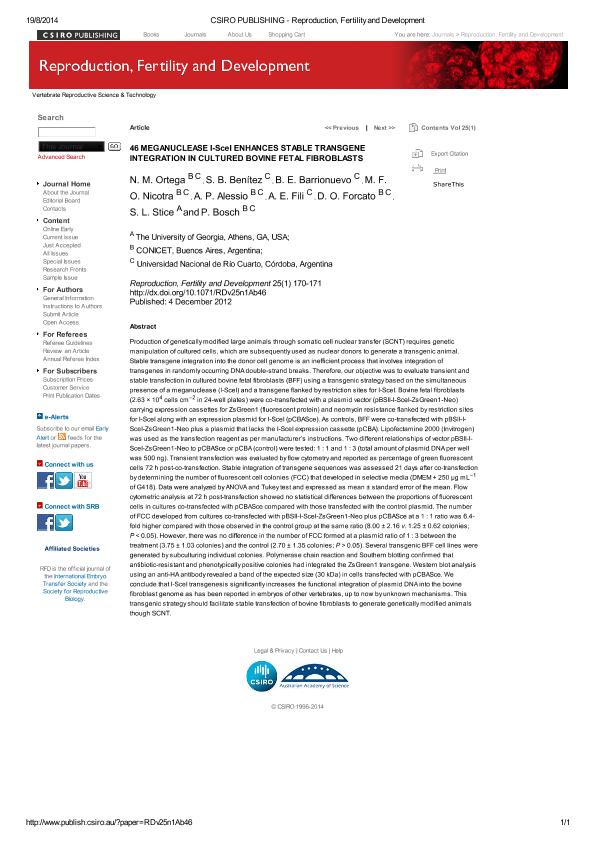Artículo
46 meganuclease i-SceI enhances stable transgene integration in cultured bovine fetal fibroblasts
Ortega, Nicolás Matías ; Benitez, S. B.; Barrionuevo, Blanca Elizabeth; Olmos Nicotra, Maria Florencia
; Benitez, S. B.; Barrionuevo, Blanca Elizabeth; Olmos Nicotra, Maria Florencia ; Alessio, Ana Paula
; Alessio, Ana Paula ; Fili, Alejandro
; Fili, Alejandro ; Forcato, Diego Oscar
; Forcato, Diego Oscar ; Stice, S. L.; Bosch, Pablo
; Stice, S. L.; Bosch, Pablo
 ; Benitez, S. B.; Barrionuevo, Blanca Elizabeth; Olmos Nicotra, Maria Florencia
; Benitez, S. B.; Barrionuevo, Blanca Elizabeth; Olmos Nicotra, Maria Florencia ; Alessio, Ana Paula
; Alessio, Ana Paula ; Fili, Alejandro
; Fili, Alejandro ; Forcato, Diego Oscar
; Forcato, Diego Oscar ; Stice, S. L.; Bosch, Pablo
; Stice, S. L.; Bosch, Pablo
Fecha de publicación:
12/2012
Editorial:
Csiro Publishing
Revista:
Reproduction Fertility and Development
ISSN:
1031-3613
Idioma:
Inglés
Tipo de recurso:
Artículo publicado
Clasificación temática:
Resumen
Production of genetically modified large animals through somatic cell nuclear transfer (SCNT) requires genetic manipulation of cultured cells, which are subsequently used as nuclear donors to generate a transgenic animal. Stable transgene integration into the donor cell genome is an inefficient process that involves integration of transgenes in randomly occurring DNA double-strand breaks. Therefore, our objective was to evaluate transient and stable transfection in cultured bovine fetal fibroblasts (BFF) using a transgenic strategy based on the simultaneous presence of a meganuclease (I-SceI) and a transgene flanked by restriction sites for I-SceI. Bovine fetal fibroblasts (2.63 × 104 cells cm–2 in 24-well plates) were co-transfected with a plasmid vector (pBSII-I-SceI-ZsGreen1-Neo) carrying expression cassettes for ZsGreen1 (fluorescent protein) and neomycin resistance flanked by restriction sites for I-SceI along with an expression plasmid for I-SceI (pCBASce). As controls, BFF were co-transfected with pBSII-I-SceI-ZsGreen1-Neo plus a plasmid that lacks the I-SceI expression cassette (pCBA). Lipofectamine 2000 (Invitrogen) was used as the transfection reagent as per manufacturer’s instructions. Two different relationships of vector pBSII-I-SceI-ZsGreen1-Neo to pCBASce or pCBA (control) were tested: 1 : 1 and 1 : 3 (total amount of plasmid DNA per well was 500 ng). Transient transfection was evaluated by flow cytometry and reported as percentage of green fluorescent cells 72 h post-co-transfection. Stable integration of transgene sequences was assessed 21 days after co-transfection by determining the number of fluorescent cell colonies (FCC) that developed in selective media (DMEM + 250 µg mL–1 of G418). Data were analyzed by ANOVA and Tukey test and expressed as mean ± standard error of the mean. Flow cytometric analysis at 72 h post-transfection showed no statistical differences between the proportions of fluorescent cells in cultures co-transfected with pCBASce compared with those transfected with the control plasmid. The number of FCC developed from cultures co-transfected with pBSII-I-SceI-ZsGreen1-Neo plus pCBASce at a 1 : 1 ratio was 6.4-fold higher compared with those observed in the control group at the same ratio (8.00 ± 2.16 v. 1.25 ± 0.62 colonies; P < 0.05). However, there was no difference in the number of FCC formed at a plasmid ratio of 1 : 3 between the treatment (3.75 ± 1.03 colonies) and the control (2.70 ± 1.35 colonies; P > 0.05). Several transgenic BFF cell lines were generated by subculturing individual colonies. Polymerase chain reaction and Southern blotting confirmed that antibiotic-resistant and phenotypically positive colonies had integrated the ZsGreen1 transgene. Western blot analysis using an anti-HA antibody revealed a band of the expected size (30 kDa) in cells transfected with pCBASce. We conclude that I-SceI transgenesis significantly increases the functional integration of plasmid DNA into the bovine fibroblast genome as has been reported in embryos of other vertebrates, up to now by unknown mechanisms. This transgenic strategy should facilitate stable transfection of bovine fibroblasts to generate genetically modified animals though SCNT.
Palabras clave:
Meganuclease
,
Transgenesis
,
Bovine
,
Fibroblast
Archivos asociados
Licencia
Identificadores
Colecciones
Articulos(CCT - CORDOBA)
Articulos de CTRO.CIENTIFICO TECNOL.CONICET - CORDOBA
Articulos de CTRO.CIENTIFICO TECNOL.CONICET - CORDOBA
Citación
Ortega, Nicolás Matías; Benitez, S. B.; Barrionuevo, Blanca Elizabeth; Olmos Nicotra, Maria Florencia; Alessio, Ana Paula; et al.; 46 meganuclease i-SceI enhances stable transgene integration in cultured bovine fetal fibroblasts; Csiro Publishing; Reproduction Fertility and Development; 25; 1; 12-2012; 170-171
Compartir
Altmétricas



